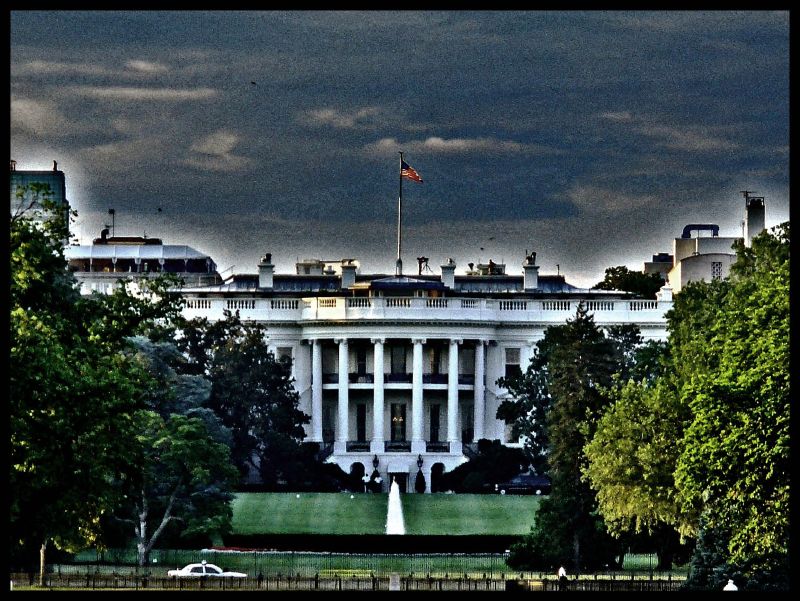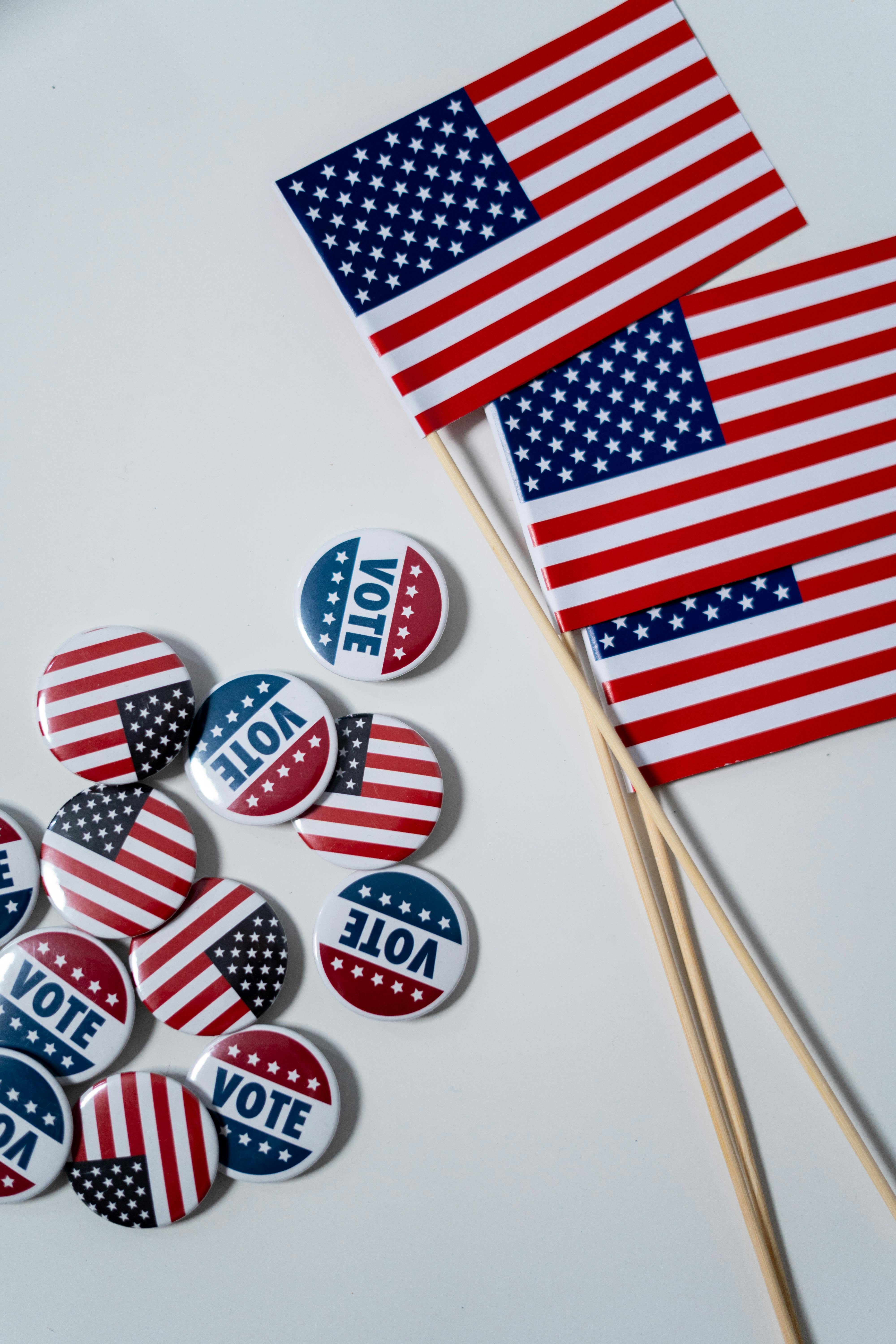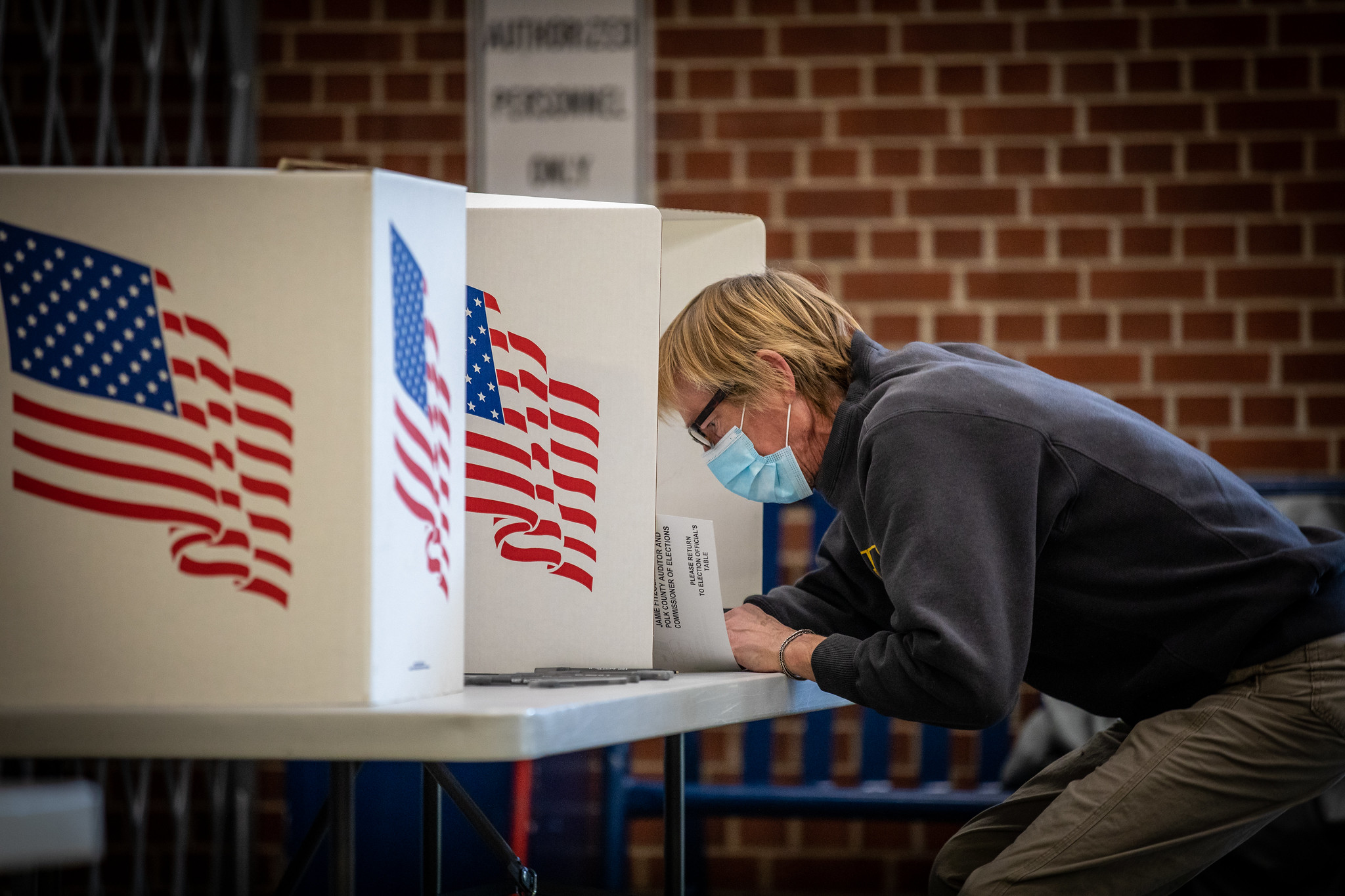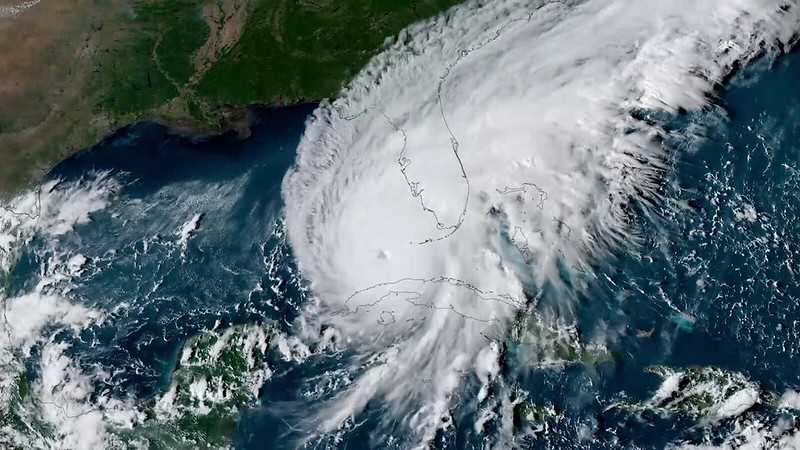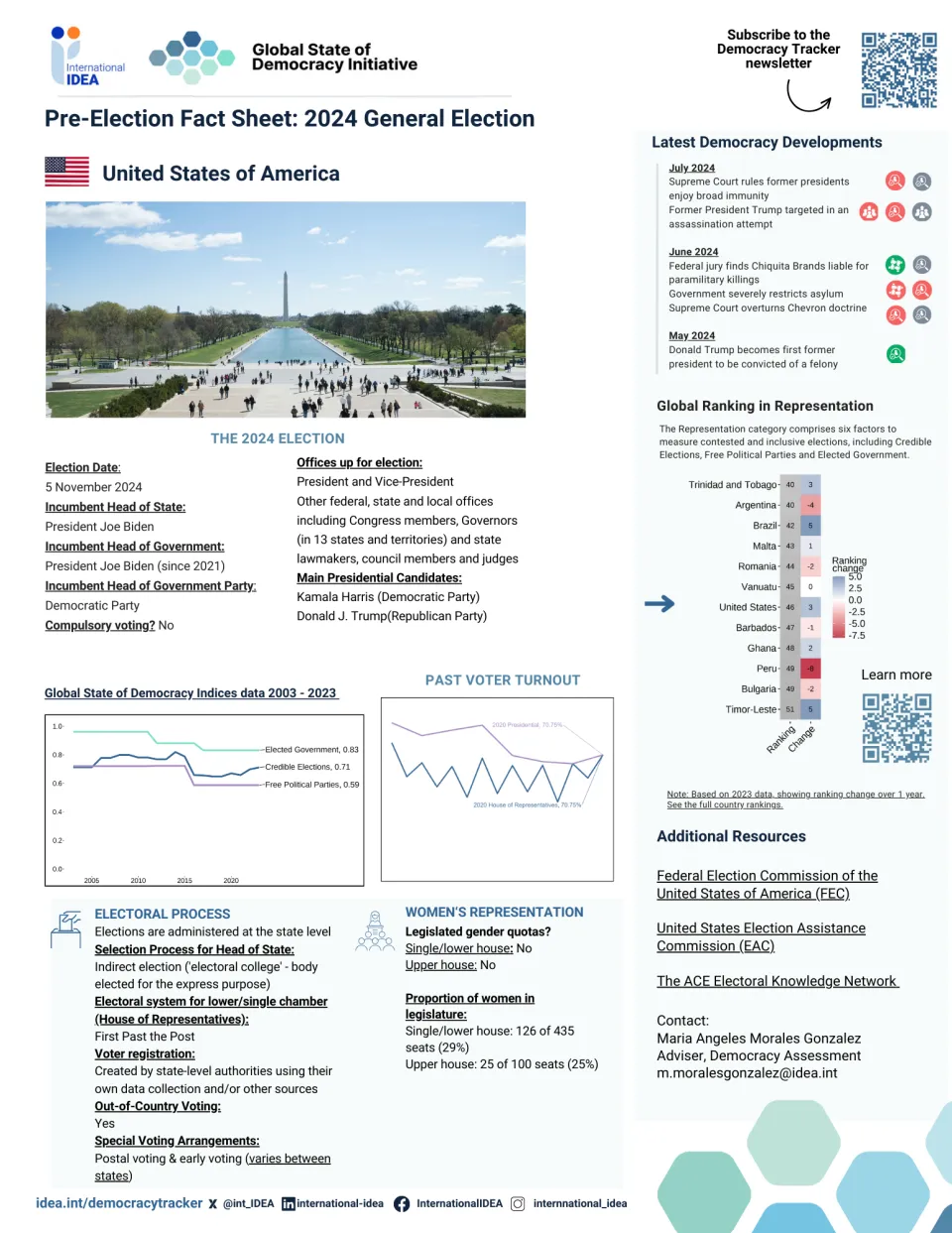
United States of America
The United States of America (US) performs in the high-range across the Representation, Rights and Participation categories of the Global State of Democracy framework, and in the mid-range in Rule of Law. It performs among the top 25 per cent globally regarding most factors of democracy. Since 2019, it has experienced improvements in Credible Elections and Absence of Corruption and declines in Economic Equality. With the world’s largest economy (fueled considerably by the services and industry sectors) and largest military (by expenditure), the US plays a prominent economic and geopolitical role in the world.
The population of the US is mostly white, with Black, Hispanic, Asian, and Indigenous minorities. Four decades of increasing income inequality have produced a substantial wealth gap, with poverty rates disproportionately higher among minority communities. The history of African slavery, racial segregation and discrimination continues to be reflected in an expanding racial wealth gap and the disproportionate rate of Black incarceration. Race issues have gained new political salience in recent years (including increasing calls for reparations), especially around high-profile police killings of Black civilians, galvanizing the Black Lives Matter movement. But they have also been a polarizing cause, with the new government backtracking diversity initiatives and a recent ruling ending affirmative action in college admissions.
Although several important milestones for gender equality have been achieved in the US, women’s political participation continues to lag. The formal end of abortion rights and attempts to restrict access to contraception and sexual healthcare have further challenged and politicized women’s rights. Same-sex marriage has been legal in all states since 2015; however, LGBTQIA+ rights, particularly trans-rights and gender identity have become an increasingly polarizing issue.
The US’s two-party system is well-entrenched and stimulates nationally competitive elections, but gerrymandering has resulted in minimally competitive legislative districts. The weakening of the Voting Rights Act of 1965 (VRA) and voter suppression have also threatened electoral integrity for well over a decade. Refusal to concede defeat after the 2020 elections, and a violent riot at the US Capitol on 6 January 2021, laid the groundwork for a political movement that, to this day, casts doubt (without evidence) on the American electoral system.
Current political debates revolve around the newly elected administration’s efforts to fundamentally change the way the US government works and threaten the balance of power. Executive orders have halted the disbursement of congressionally approved funds and challenged the authority of the courts on a wide array of issues. As the government’s measures to curb undocumented migration push the boundaries of what is constitutionally permissible, more Americans are questioning these policies. The use of immigration enforcement against people with viewpoints opposing the new government has raised alarms among free speech advocates. The unevenly distributed socioeconomic fallout of the 1990s rollback of the welfare state and the rise of China, weak gun control and widespread mass shootings, are other salient issues in the US.
Persistent issues with voter disenfranchisement and gerrymandering are key to watch, due to their potential to impact Representation. The country is increasingly polarized, with levels of political violence at the highest since the 1970s. The Political Equality factor is also crucial, with emphasis on women’s reproductive rights, Economic Equality, the country’s racialized politics and immigration.
Last Updated: July 2025
https://www.idea.int/democracytracker/
November 2025
U.S. strikes against alleged drug-smuggling boats raise legal concerns
Between September and at least up until mid-November, the US military has carried out strikes on alleged drug trafficking boats in the Caribbean and East Pacific, killing at least 83 people. Those killed include people from Venezuela, Ecuador, Colombia and Trinidad and Tobago. The U.S government has justified the strikes based on the assertion that the country is engaged in a non-international armed conflict and that drug traffickers are causing the deaths of thousands of Americans. Several measures to block the strikes under the 1973 War Powers Resolution (a resolution that sought to reaffirm congressional oversight over a war declaration) have failed in the Senate. Though Congress was notified when the strikes began, critics have stressed the need for Congressional approval of military action that exceeds 60 days (which happened on November 4) and is absent a certification of military necessity (as required by the War Powers Resolution). Experts note the need for drug trafficking to be curtailed through law enforcement instead of military action.
Sources: The New York Times (1), CBS News, The New York Times (2), BBC, NBC News, AP News, The New York Times (3), Just Security
President Trump calls for Democratic lawmakers to be arrested
Following the release of a video in which Democratic lawmakers urged members of the military to refuse illegal orders, President Trump used social media to call for their arrest and trial, characterizing their actions as sedition and noting that sedition is punishable by death. The posts were widely condemned, particularly given the current climate of political polarization and recent incidents of political violence. The White House later denied that the statements constituted a threat of death or violence. Reports that the Federal Bureau of Investigation and Department of Justice had opened inquiries into the lawmakers featured in the video were also criticized by Democrats as harassment and intimidation.
Sources: Politico, NBC News, The New York Times, BBC, Senate Judiciary Committee
October 2025
Millions take part in ‘No Kings’ protest
On 18 October, an estimated 7 million people across all 50 states and about 2,600 locations took part in the ‘No Kings’ protests against President Donald Trump. The peaceful mobilizations, one of the largest in U.S. history and the largest of this century, voiced opposition to the Trump administration’s policies and agenda, including its immigration strategy, the reversal of respect for certain rights and attempts to broaden presidential power. Trump and other government officials attempted to discredit the movement, labelling it ‘anti-American’ and organized by the ‘radical’ left. Despite attempts by some officials to characterize participants as violent, the demonstrations were overwhelmingly peaceful, with only minor clashes involving counter-protesters. The protest surpassed the attendance records of the first ‘No Kings’ protest in June (nearly 6 million people in attendance) and the 2017 Women’s March (nearly 5.3 million in attendance).
Sources: ACLU, CNN, New York Times
Trump submits complaint to Justice Department over prosecutions

In October, it was revealed that President Donald Trump submitted a claim for compensation from the Department of Justice (DOJ) in which he has demanded payment of USD 230 million. The claims were filed in 2023 and 2024, prior to the start of his second term. One of the claims regards the investigation into alleged Russian interference during the 2016 election, an inquiry that began during his first term in office. The second concerns the classified documents investigation and the search of his Mar-a-Lago property in 2022. The claims have raised concerns over a potential conflict of interest. The DOJ officials who would have the power to approve any settlement—the deputy attorney general and associate attorney general—represented him and a co-defendant, respectively, in the inquiry into the alleged mishandling of classified documentation. Trump has publicly asserted that the final decision over the claims rests in his hands.
Sources: New York Times, CBS, The Guardian, Axios, CNN
September 2025
Conservative activist Charlie Kirk is assassinated

On 10 September, conservative political activist Charlie Kirk was shot and killed during an event at Utah Valley University for his youth organization, Turning Point USA. A suspect (a 22-year-old man) surrendered and was arrested the following day and charged with several state crimes, including aggravated murder, obstruction of justice, firearms felonies, witness tampering and violence committed in the presence of a child. Several officials characterized or suggested the assassination was politically motivated, citing Kirk’s conservative activism and the accused’s political beliefs. Evidence against the accused includes texts in which he wrote that he ‘had enough of [Kirk’s] hatred’, and further texts, social media messages and conversations with family members in which he appeared to confess to the killing. The prosecutors’ charges against the accused do not cite a motive.
Sources: AP News (1), AP News (2), PBS, The New York Times, BBC,
Freedom of speech restricted in the aftermath of Charlie Kirk’s assassination
In the aftermath of the assassination of conservative activist Charlie Kirk, government officials announced investigations into ‘left-wing extremism’, suggesting it played a part in Kirk’s killing. Some officials, including Vice-President J.D. Vance, also encouraged people to report negative opinions or comments on Kirk’s assassination to employers or authorities such as the State Department. As a result, reports have emerged of workers being fired or visas being revoked; days after the shooting, up to 33 people had been fired or suspended from their jobs. In this context, political leaders are openly targeting political opponents, who they accuse of fomenting violence without any evidence. Trump administration officials hinted that investigations into left-leaning organizations could take place; without naming specific action on them, some philanthropic organizations such as the Ford Foundation and Open Society Foundations were named.
Sources: The Guardian, Reuters, BBC, Politico, Newsweek, ABC News
FCC threatens action over comedian Jimmy Kimmel’s monologue
On 17 September, Brendan Carr, Chair of the Federal Communications Commission, made an implied threat to fine or revoke the licenses of the ABC network’s affiliate stations, over a monologue by comedian Jimmy Kimmel. The monologue at issue referred to reaction among conservative politicians to the assassination of Charlie Kirk and to the possible political affiliation of the suspect. The same day, the ABC network issued a statement announcing the suspension of Kimmel’s show. The network reinstated his show days later after public outcry and criticism from politicians, including some Republican lawmakers. Mr. Carr later denied having a role in the suspension, which he characterized as a business decision by Kimmel’s employer.
Sources: The New York Times, CNN, Brookings, The Guardian
Government adopts controversial measures to combat domestic terrorism and political violence
In September, the President issued an executive order designating Antifa as a domestic terrorist organization. It was followed by memorandum NSPM-7 on domestic terrorism and ‘organized political violence’. Congress has not established a legal basis for the government to classify domestic terrorism. Antifa (short for anti-fascist), is not an organized group, but an ideology related to radical and far-left beliefs. NSPM-7 selectively references incidents of political violence attributed to people with left-leaning ideologies, uses vague terms such as ‘anti-Americanism’ and ‘anti-Christianity’, directing Joint Terrorism Task Forces to investigate radicalization and the IRS to ensure no tax-exempt entities provide support to political violence or terrorism. The measures raised alarms over the use of broad terms that appear to target groups critical of the administration, and their impact on free speech and civil society.
Sources: The White House (1), The White House (2), ACLU, Washington Post, The Guardian, Axios, Brennan Center
Pentagon restricts press access
On 19 September, the Department of Defense announced a series of restrictions on journalists covering the Pentagon, arguing security risks. These included a requirement that officials approve journalists’ reporting, even if regarding unclassified information. Credentials and access to the Department of Defense’s headquarters would be revoked for those not in compliance. In the months leading to the announcement, some restrictive measures were implemented, such as the requirement that journalists be accompanied by an escort in some Pentagon locations, a departure from previous practice. On 15 October, ahead of the deadline to sign a pledge regarding the observance of the new guidelines, the vast majority of media organizations covering the Pentagon rejected the conditions, turning in their badges and leaving their workspaces.
Sources: Politico, NPR, New York Times, Washington Post, AP
Indictments raise concerns over politicization of Justice Department
On 25 September, a federal grand jury indicted James Comey, a former FBI director on charges of making a false statement and obstruction of justice. Comey pleaded not guilty to the charges, which relate to testimony he gave to the Senate Judiciary Committee in a 2020 hearing, regarding whether he had authorized an FBI official to leak information to the press. It followed President Trump’s statements on social media appearing to pressure Attorney General Pam Bondi to secure indictments against Comey and other perceived political rivals, including Senator Adam Schiff and New York Attorney General Letitia James. James was subsequently indicted on 9 October on charges of bank fraud and making false statements to a financial institution. Given Trump’s public statements and the resignation and replacement of the prosecutor overseeing both cases (apparently after expressing concern over the insufficiency of evidence), critics have widely characterized the prosecutions as politically motivated and an alarming politicization of the Department of Justice.
Update: On 24 November, a federal judge dismissed the cases against James Comey and Letitia James, finding that the U.S. Attorney who oversaw their case had been illegally appointed. Subsequently, on 5 December, a grand jury declined to re-indict James.
Sources: U.S. Department of Justice (1), U.S. Department of Justice (2), BBC, ABC News, NPR, The New York Times, CNN, New York Times, The Guardian
Government shuts down amid political impasse
On 30 September, after an impasse in Congress over funding legislation, the federal government shut down. The last time the government shut down was between December 2018 and January 2019. Senate Republicans and Democrats disagreed over the terms of a bill to continue funding the government. Disagreement concerns the extension of health care subsidies and reversal of cuts to Medicaid (a program that assists some low-income families and other eligible people to cover medical costs), which Democrats have prioritized. The Trump administration warned that the lack of funding approval would result in mass firings of officials (thousands of whom have already been dismissed), and the cancellation of government funded programs. By mid-October, the shutdown continued.
Update: On 12 November, President Trump signed a bill to fund the government after 43 days of shutdown. This was the longest government shutdown in the history of the United States. The legislation is the result of a compromise after a group of Democratic senators agreed to extend funding, in exchange for a vote in December to extend health care subsidies and the reinstatement of fired federal workers. The House of Representatives passed the bill mostly along party lines. The compromise bill funds the government through 30 January.
Sources: CNN, BBC, Reuters, AP, US. Congress
August 2025
President orders federal control of D.C. police and deployment of national guard
On 11 August, President Donald Trump ordered federal control of the Metropolitan Police Department of the District of Columbia (D.C.), after declaring a ‘crime emergency’ and invoking the D.C. Home Rule Act. He further directed the Attorney General to temporarily oversee D.C. police, deployed National Guard units (eventually armed) from D.C. and six states, and tasked federal law enforcement agencies with street-level policing. The decision follows an emergency declaration related to ‘the magnitude of the violent crime crisis’ despite declines in crime rates in recent years. It is the first time that the D.C. Metropolitan Police has been placed under federal control. Mayor Muriel Bowser highlighted the unprecedented nature of the decision and the intrusion on the District’s autonomy, but announced cooperation with federal officials. Pursuant to the Home Rule Act and notification of congressional committees, federal control of police lasted 30 days. National Guard members were still deployed in D.C. in September. The President has indicated that similar moves in other cities could follow.
Sources: The White House, Reuters, The Guardian, CNN
Gerrymandering deepens across the United States
On 29 August, the Governor of Texas, Greg Abbott, signed a new gerrymandered map of the state’s U.S. House of Representatives districts into law. Responding to a demand from President Donald Trump, the redistricting openly aims to create more U.S. House districts dominated by Republican voters and is expected to result in a gain of five House seats for the Republicans. In response, California lawmakers passed bills that would improve the Democratic Party’s performance by five seats in the U.S. House; these will be voted on by Californians in November. In September, a Republican-majority legislature in Missouri followed suit, as governors of heavily Democratic and Republican states further announcing similar measures. Critics have noted that gerrymandering dilutes the power of individual voters, both by packing voters of colour into fewer districts and reducing the competitiveness of some districts.
Sources: BBC, New York Times, NPR, CNN, The Guardian
Dismissals undermine independence of economic regulators
On 25 August, President Donald Trump attempted to fire Lisa Cook, a Governor and member of the Federal Reserve board, alleging she had engaged in mortgage fraud before she assumed office. Cook sued the Trump administration to block her firing, and she was granted a temporary injunction by a District Judge pending the resolution of the suit. The administration appealed to the Supreme Court to block the injunction. The decision to dismiss Ms. Cook came after the President’s request that the Federal Reserve cut interest rates. This follows the 1 August dismissal of Erika McEntarfer from the post of Commissioner of Labor Statistics after she released reports showing a deceleration in hiring. Critics argue that these measures constitute interference with economic and regulatory entities that enjoy political independence, as established by Congress.
Sources: The Guardian, AP, CNN, BBC, New York Times, D.C. District Court
See all event reports for this country
Global ranking per category of democratic performance in 2024
Basic Information
Human Rights Treaties
Performance by category over the last 6 months
Blogs
Election factsheets
Global State of Democracy Indices
Hover over the trend lines to see the exact data points across the years
Factors of Democratic Performance Over Time
Use the slider below to see how democratic performance has changed over time

